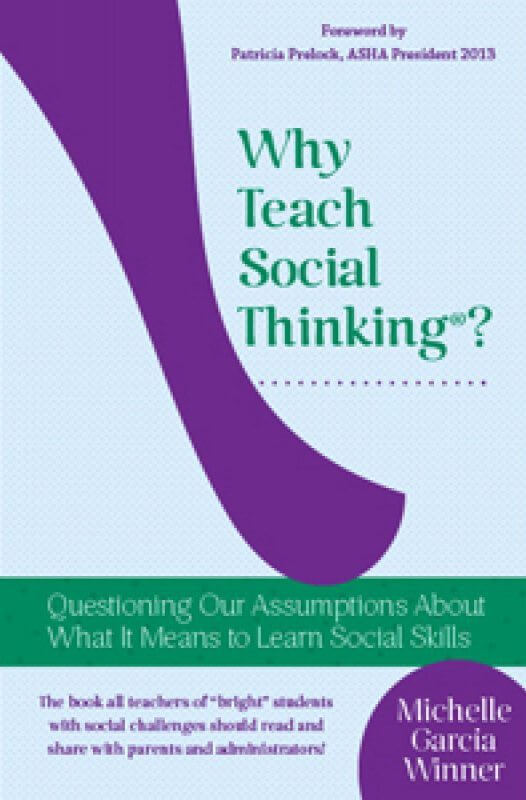
Why Teach Social Thinking?
Today’s children (both neurotypical and those with social learning challenges) are entering school with declining abilities to learn in a group, attend to a lesson, be considerate toward others, or self-regulate their own behavior. Teachers are increasingly finding themselves ill-equipped with the know-how, tools, and strategies to teach students about social awareness, emotional intelligence, and self-regulation of behavior.
If you’ve ever wanted, or needed, to make a case for social instruction to be added to a student’s treatment plan, social goals written into a student’s IEP, or social thinking lessons infused into a classroom or campus curriculum plan, Why Teach Social Thinking? drives home the importance of social learning to a student’s academic success and later success in life. Author Michelle Garcia Winner connects the dots from social emotional learning to the Common Core Standards to increased likelihood of success in adulthood.
Through exploring 12 core questions, Winner attempts to raise awareness of the many complex and interrelated issues that are at the heart of teaching social skills.
- What are social skills?
- What are the origins of social development? Is there an age when our social development stops?
- In what areas of social thinking do students with social cognitive challenges struggle? The ILAUGH Model remodeled
- What impact do weaknesses in social conceptual information have on learning the Common Core State Standards?
- When do we use social thinking and related social skills? How do we approach teaching these skills?
- How can cognitive behavior therapy address teaching social thinking and related social skills?
- Do all those with ASD-SCD benefit from the same teachings? The Social Thinking-Social Communication Profile (ST-SCP)
- Who is responsible for teaching social thinking and related social skills? Is the same set of teaching tech¬niques relevant for all persons with ASD and related social learning challenges?
- What is a framework for teaching social thinking and related skills?
- What are some guidelines for teaching social thinking and related skills to group of students?
- How does social teaching fit into what we typically call “education”?
- What are evidence-based practices? How do they apply to teaching social thinking and related social skills?
Special Features
- Why Teach Social Thinking? includes an introduction to the Social Thinking Vocabulary, Winner’s set of terms that establish a common language for adults and students of all ages to talk about and explore social concepts.
- The book outlines the Social Thinking-Social Communication Profile, a six-level system that helps parents and educators define and better understand the needs of students who function at different levels of social understanding. The Profile aligns with the recent changes in the DSM-5.
- In her typical easy-to-understand, folksy manner of explaining complex social issues, Winner also helps educators and professionals who design treatment programs understand the important difference between teaching social thinking and social skills “in the leaves” and teaching them through the root foundation of social developmental concepts. (Read related article about the Social Thinking-Social Learning Tree here.)
- Content is linked to the Common Core State Standards of education.
- Chapter 11 discusses 14 best-practice guidelines for teaching Social Thinking.
- Free Study Guide! Download the 18- page “Why Teach Social Thinking? Study Guide” to enhance discussion about social learning and social issues. Includes a pre- and post-study assessment, plus discussion questions aligned with each chapter.
How can this book be used to its fullest?
- School educators who are interested in promoting Social Thinking concepts and curriculum can use it to reinforce the idea that Social Thinking is a skill set everyone uses; it’s not just reserved for students with social learning challenges.
- Parents of children with social challenges can use many of the questions and descriptive text in making a case for Social Thinking and/or other social teaching programs to be incorporated into a child’s IEP.
- At the college/university level, the 12 questions in the book can be a springboard for graduate and post-graduate level classroom discussions. The free Study Guide further enhances learning and discussion.
- Policy makers/program planners can use the 12 questions and Study Guide for round-table discussions about teaching social skills within an education and/or treatment setting.
While we wait for public policy to catch up with the ever-present and growing needs of our students, this book will open doors to a new understanding for parents, teachers, service providers, and admin¬istrators about effective ways to teach social thinking and related social skills.
Excellent book for parents, teachers, service providers, and administrators. Discussion concepts apply to all children who struggle with social learning, whether or not they have a diagnosed disorder such as ASD, Social Communication (Pragmatics) Disorder, ADHD, or other related disorders.
$42.95
